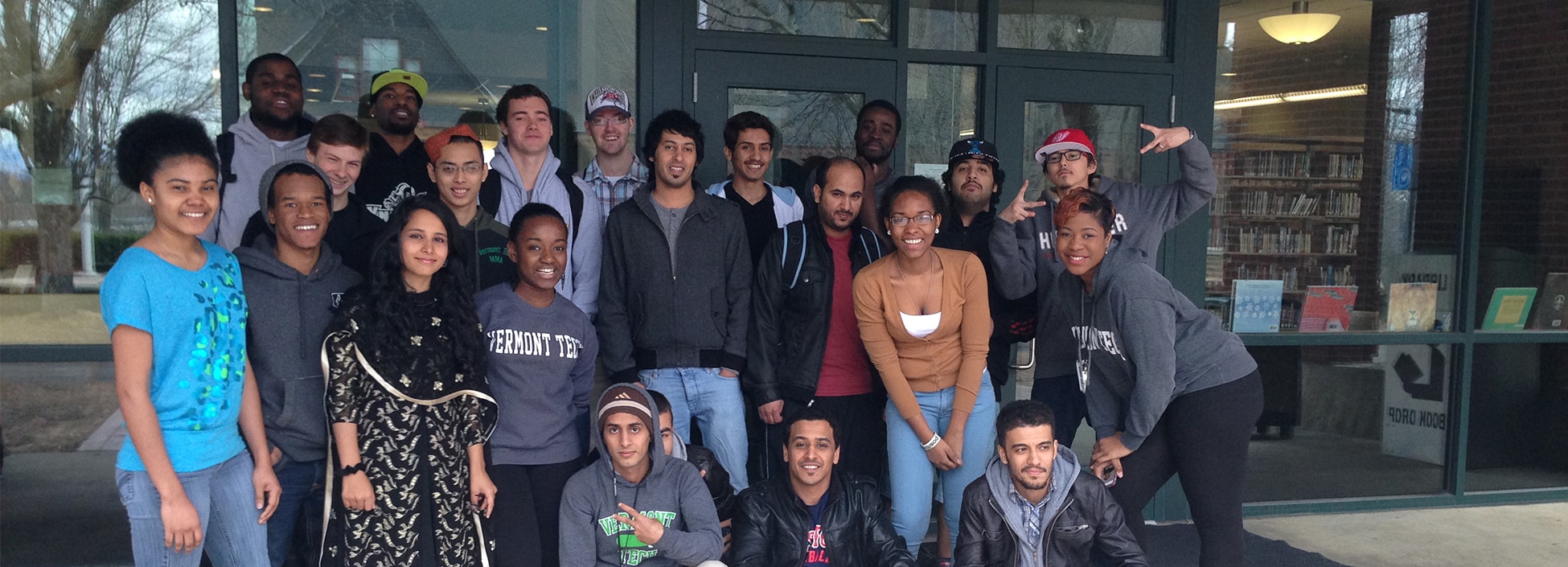Read the story on the Randolph Herald site.
Several VTC students and staff gathered over lunch on Tuesday to practice their French conversation skills led by the college’s multicultural club president Kara Bazile of Port-au-Prince, Haiti. The conversation class is part of a series of regular events the club puts on to encourage cultural awareness on campus. Hailing from almost every continent, the 15 or so committed members of the multicultural club, which was founded by Schneida Bruny, a Haitian VTC student in the class of 2013, prepared and served a Caribbean dinner for the student body in Morey Hall’s cafeteria at the end of March. Bazile chuckled as she suggested that diners arrive early as previous foreign dinners had proven quite popular.
Last month at Hartness Library, club members celebrated as they opened a three-week-long display of photos they had taken of their hometowns while they were on winter break. Traditional dancers in the Ukraine, a vibrant marketplace in Haiti, snowcapped mountains in Pakistan, and a foggy harbor in Saudi Arabia were the subjects of just a few of the images that represent the club’s diversity. At the club’s “Turning Point” events, members share presentations about their home lifestyles and cultures and, often, the struggles they have overcome to be able to pursue higher education in the United States. Bazile immigrated to Connecticut to finish high school when her school in the Haitian capital was destroyed in the massive 2010 earthquake.
Recruitment
For other students, like the club’s vice president Shana LinwoodMcLaughlin, who is originally from Honduras but now lives in the Cayman Islands, athletics provided the initial pull to VTC — she’s on the Knights basketball team. That, along with the college’s growing reputation abroad. According to Nate Ball, VTC’s assistant director of admissions, the Internet and word of mouth have been VTC’s primary recruitment methods for foreign students. “When you have students come here and they’re successful and they do well, they tell their friends, they tell their families.” That networking has been what Ball describes as a “huge success.”
He estimates that 5% of VTC’s student body originates from be- yond the United States, a figure which has grown in the last few years. It is “amazing,” he said, that students on such a small, rural campus can sit down in class next to students from around the world. There is a lot of room for discussion especially in humanities classes, where students write about and explore a wide range of topics.
Developing fluency in English is a major advantage for the international students who graduate from VTC and later seek work in the United States, their home countries, or in other countries, Ball noted. The practicality and the technical nature of their degrees coupled with the knowledge of multiple languages make VTC’s international graduates employable almost anywhere, he said. In the early days of his career at VTC, where over 80% of students are Vermonters, Ball did not expect to eventually be working exclusively with international students.
Of the international student body, Saudis make up a large portion, as do Australians, Ball said. However, the up-and-coming market for VTC’s foreign students is India, and Ball has already reviewed six admissions applications for the fall of this year from prospective Indian students. A relatively significant international student body also exists on VTC’s Williston campus. Due to its proximity to Burlington’s immigrant communities, the suburban campus entices many Nepalese and African refugees. Saudis, who are slightly more numerous in Williston than in Randolph Center, often live with family members in the greater Burlington area.
U.S. Education
As attractive as a degree from an American college can be, the U.S. is certainly not the most affordable place to pursue an education. As a small public college, VTC is simply unable to offer the financial aid packages of a major private university. The school does its best to help, Ball said, offsetting the cost for foreign students to live on campus, for example, but ultimately, foreign students “do need to come having the ability to support themselves to a certain extent,” Ball explained.
This past year alone, the school created and filled two positions for international student resource coordinators. Students from outside of the U.S. often require assistance obtaining student visas, determining travel logistics to and from VTC, and acquiring Vermont drivers’ licenses, said Kathleen Mason, who is the international coordinator on the Randolph Center campus. Many young adults who attend VTC decide to become American citizens, a process in which Mason is also involved.
